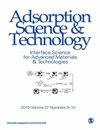Food’s Waste Water Biosolid Assessment against Toxic Element Absorbability of Food’s Cropping Soil Plant by Dominance Theory
IF 2.8
4区 工程技术
Q2 CHEMISTRY, APPLIED
引用次数: 0
Abstract
The blending of the Food’s Waste Water Biosolid (FWWB) fertilizer with Food’s Cropping Soil (FsCS) results the absorption of the toxic macromicroorganisms from FsCS (is known as absorbability index). It is observed that such as blending not only increase the fertility and productivity of FsCS by neutralizing or absorbing the macromicroorganisms but also catering the necessary nutrition to plants. The authors sensed that a few research works are conducted recently in the dimension of evaluating the best FWWB among available FWWBs under O -(objective) FWWB’s parameter models. On potential analysis of published research works, the authors claimed that there is yet no research document, which can evaluate the best FWWB among available FWWBs or assess the best absorbability index of O -(objective) as well as S -(subjective) FWWB’s model corresponding to evaluated FWWBs or alternative points. It is accepted as a first research challenge. On extensive review, the authors determined that published FWWB’s parameter models are simulated by only single or nondynamic multivariable optimization techniques, which is accepted as a second research challenge. To address both research challenges, preliminary, the authors developed and proposed FWWB’s parameter model, consisted of physical, chemical, and biological parameters corresponding to O and S in nature via auditing a real case of FWWB alternative points such as Narendr Rice Mill- P 1 , Liese Mahamaya Rice Mill- P 2 , Vijay Rice Mill- P 3 , Mahim Rice Mill- P 4 , and Dhansingh Rice Mill- P 5 and their characteristics vs. parameters. Next, the authors framed the FWWB parameter model by acquiring O and S information against O -physical, chemical, and S -biological parameters corresponding to FWWB alternative points. To evaluate the results, the authors applied the robust multiparameter optimization “RMPO” (crisp VIKOR “VIseKriterijumska Optimizacija I Kompromisno Resenje” and FMF “Full Multiplicative Form technique with dominance theory”) approach on defuzzified S -data and O -data to evaluate the best FWWB point among available based on absorbability index assessment. The results are described in summary part.利用优势理论评价食品废水生物固体对粮食作物土壤植物有毒元素吸收能力的影响
将食品废水生物固体(FWWB)肥料与食品种植土壤(FsCS)混合,可吸收FsCS中的有毒大型微生物(称为吸收指数)。据观察,这种混合不仅通过中和或吸收大量微生物来提高FsCS的肥力和生产力,而且还为植物提供必要的营养。作者感觉到,最近在O(客观)FWWB的参数模型下,在评估可用FWWB中的最佳FWWB方面进行了一些研究工作。关于已发表的研究工作的潜在分析,作者声称,目前还没有研究文件可以评估可用FWWB中的最佳FWWB,或者评估与评估的FWWB或备选点相对应的O-(客观)和S-(主观)FWWB模型的最佳吸收指数。它被认为是第一个研究挑战。在广泛的综述中,作者确定已发表的FWWB的参数模型仅通过单一或非动态多变量优化技术进行模拟,这被认为是第二个研究挑战。为了应对这两个研究挑战,初步而言,作者开发并提出了FWWB的参数模型,该模型由与自然界中的O和s相对应的物理、化学和生物参数组成,通过审计FWWB替代点的真实案例,如Narendr Rice Mill-P1、Liese Mahamaya Rice Mill-P 2、Vijay Rice Mill-P3,Mahim碾米机-P4和Dhansingh碾米机-P 5及其特性与参数的关系。接下来,作者通过获取与FWWB备选点对应的O物理、化学和S生物参数的O和S信息,构建了FWWB参数模型。为了评估结果,作者在解模糊的S-数据和O-数据上应用了稳健的多参数优化“RMPO”(crisp VIKOR“VIseKriterijumska Optimizacija I Kombrissino Resenje”和FMF“具有优势理论的全乘法形式技术”)方法,基于吸收指数评估来评估可用的FWWB中的最佳点。总结部分介绍了研究结果。
本文章由计算机程序翻译,如有差异,请以英文原文为准。
求助全文
约1分钟内获得全文
求助全文
来源期刊

Adsorption Science & Technology
工程技术-工程:化工
CiteScore
5.00
自引率
10.30%
发文量
181
审稿时长
4.5 months
期刊介绍:
Adsorption Science & Technology is a peer-reviewed, open access journal devoted to studies of adsorption and desorption phenomena, which publishes original research papers and critical review articles, with occasional special issues relating to particular topics and symposia.
 求助内容:
求助内容: 应助结果提醒方式:
应助结果提醒方式:


